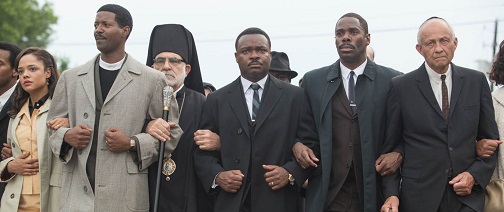***** out of 5
128 minutes
Rated PG-13 for disturbing thematic material including violence, a suggestive moment, and brief strong language
Paramount Pictures
Article originally published at The Reel Place.
If you’re going to make a movie about Martin Luther King Jr., it
better be powerful. Thankfully, that’s exactly what we get from director
Ava DuVernay’s biopic Selma. With the help of screenwriter Paul
Webb, the two bring us an almost slice-of-life take on the genre.
Focusing on a single event that was nothing short of crucial to King’s
impact on the Civil Rights Movement. DuVernay may surround David
Oyelowo’s portrayal of King with an all-star cast, but he carries the
film on his own — something anyone poised with representing a man of
such acclaim should be able to do effectively.
Opening with King’s Nobel Peace Prize in 1964, we move onto the
bombing of a Birmingham, Alabama church which killed four innocent
little girls. We are also introduced to Annie Lee Cooper (Oprah Winfrey)
trying to register to vote in Selma, Alabama. Segregation may be
illegal in the United States, but that hasn’t stopped it from happening.
This particular portion of the Civil Rights Movement involves King’s
meetings with President Lyndon B. Johnson (Tom Wilkinson) and his
advisor Lee C. White (Giovanni Ribisi) where King is trying to get the
President to stop the intimidation tactics used to prevent blacks from
registering to vote.
With Johnson putting the voting issue on the back-burner, J. Edgar
Hoover (Dylan Baker) keeps asking if there’s anything the FBI can do to
“help.” Pressure starts to rise when King heads to Selma to form a
peaceful protest which leads to outbursts of violence and the
possibility of a 54-mile march to Montgomery. But even the most peaceful
protests can lead to deadly consequences, most importantly the shooting
death of Jimmie Lee Jackson (Keith Stanfield) and minister James Reeb
(Jeremy Strong).
A film like Selma could stand as a wake up call if it weren’t
for the terrifying situation recently in Ferguson, Missouri and New York
City with the deaths of black men Michael Brown and Eric Garner.
Unfortunately, in today’s world, we don’t have a Martin Luther King Jr.
to lead the way, but it seems that’s exactly what we need. The United
States is still overcoming these issues and someday we can all dream
that they will finally end. It’s particularly sad that it’s been 50
years and the nation is still full of racism and bigotry. It seems like
maybe people are just better at hiding it to avoid the consequences. But
recent events just make Selma seem as timely as ever — and even more important.
Selma is an important movie and can hopefully point out that
the more we try to change, unfortunately, the more things stay the same.
History is trying repeating itself, and we should not be moving
backward. We need more movies like Selma to help us never forget the fight that’s still ongoing today.
As for the film itself, DuVernay does a masterful job of bringing
1965 to life, for better and worse. She’s able to get a transformative
performance out of Oyelowo, and even the more minor supporting
characters get chances to shine. Carmen Ejogo as Coretta Scott King, in
particular, sheds a light on what it must have been like to be married
to such an important figure, never shying away from the terror that also
came with it. Don’t be surprised to see Brad Pitt’s name as producer,
he also helped bring us 2013’s Best Picture winner 12 Years a Slave. And there’s no doubt we’ll be seeing Selma nominated when the contenders are finally announced for 2014. Selma is without a doubt one of the best, and most important, film’s of 2014.
Photo courtesy Paramount Pictures


No comments:
Post a Comment